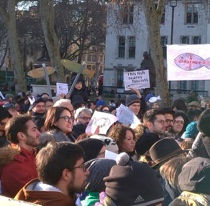Welcome to the Open Sea
- Oltremànica

- Jan 30, 2020
- 3 min read
Updated: Feb 17, 2020
By Flavia Russo
( La versione in italiano di questo articolo è qui).

“Dear Populists, you guessed it. The party is over. You pulled the rope of our feelings for too long. You stretched it too far and now it has snapped. For years you have spilled lies and hate on our fellow-citizens: you merged truths and falsehoods to portray the world in the way that suited you, took advantage of our good faith, fears and difficulties to capture our attention. You chose to drown your political discourse and propaganda in an ocean of communication that is empty of substance…
For too long we let you do it because we were shocked, dazed, horrified from how low you could go.
But now we have woken up. And you are the ones that should be fearful. We gathered in a square and looked into each other’s eyes. We counted ourselves. It was pure energy. Do you know what we understood? That we just have to look around to realise that we are a lot and much stronger than you…”
*******

This is the message that Italy’s Movimento delle Sardine is sending to the populist personalities of Italy and, most directly, to ex-minister and leader of the Lega party Matteo Salvini.
For a long time, the fundamental problem in Italy has been that Italians have lost hope in their government. When there is no solution that seems to be working and a character as drastic and radical as Matteo Salvini takes stage, it is not surprising that discriminatory discourse and behaviours are accepted, as populism festers and takes advantage of the anger, distrust and frustration felt by Italian society. Salvini’s “simple” and radical solutions make Italians believe that these can work, not realising that his are not policies, but propaganda that blames others for Italy’s government own mistakes and flaws.
But now Italy has woken up. Bologna, Modena, Sorrento, Palermo, Reggio Emilia, Firenze, Napoli, Milano, Rome and Cagliari are a few of the cities that have come together to stand up against Italian populist tyranny in a peaceful, politically-untied manner. Movimento delle Sardine has no affiliations to political parties nor does it use or show any kind of political slur or symbol- just images, cut-outs and posters of sardines that are being carried through Italian streets.
Four young friends in their thirties -Mattia, Roberto, Giulia and Andrea- are the minds behind Italy’s newest yet powerful social movement. Through protests, events and social media networks they created Movimento delle Sardine that is re-uniting Italy, seeking to rise up against populism and to oppose Salvini’s racist, rude and rebellious politics that is bruising so many people in Italy.
The choice of the symbol that represents the movement was not chosen by chance; a silent fish, juxtaposing against the loud political parties. Sardines are numerous, never alone; they stay close together as they swim against the strong currents of the ocean- just like the 15 thousand people in the first organised flash-mob in Piazza Maggiore, Bologna, on the 14th of November and like the countless others that filled the main squares of Italian cities united in the protest against populism.
The 14th of December marked the one-month birthday of the movement and to celebrate, Italians everywhere gathered in city squares to reinforce the presence of the Sardine. Alongside Italy, Italians in Amsterdam, Berlin, Sydney, New York and many other worldwide cities, came together to share stories and experiences of exclusions, unhappiness and unfairness of the Italian political system in the hope that lessons can be learnt. In London, Movimento delle Sardine was also very much alive, particularly on that Saturday 14th at Parliament Square under the winter sun. Feelings of unity, support and hope for real, positive, constructive and productive change undeniably joins together Italians away from home. Most importantly, it lets populists and Salvini know that the Sardine are present everywhere, ready to fight against rhetoric and policies that does not represent the Italian population; because “L’Italia non si Lega”.





Comments